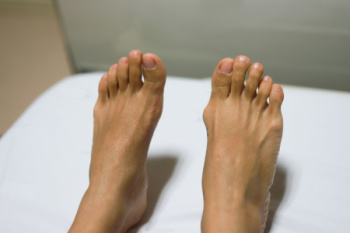
A bunion is a bony protrusion that forms at the base of the big toe, causing the toe to angle inward toward the second toe. This condition often results in discomfort and can lead to changes in foot structure. Symptoms include pain, swelling, and redness at the site of the bunion, along with the formation of a hard, prominent bump. Movement of the big toe can become restricted, leading to difficulty finding comfortable footwear. Risk factors for developing bunions include genetic predisposition, wearing tight or ill-fitting shoes, and conditions that affect foot mechanics like arthritis. If you have symptoms of a bunion, it is suggested that you schedule an appointment with a podiatrist who can offer you effective relief and treatment methods.
If you are suffering from bunion pain, contact one of our doctors of Favor Foot Ankle Leg & Wound Center. Our doctors can provide the care you need to keep you pain-free and on your feet.
What Is a Bunion?
Bunions are painful bony bumps that usually develop on the inside of the foot at the joint of the big toe. As the deformity increases over time, it may become painful to walk and wear shoes. Women are more likely to exacerbate existing bunions since they often wear tight, narrow shoes that shift their toes together. Bunion pain can be relieved by wearing wider shoes with enough room for the toes.
Causes
- Genetics – some people inherit feet that are more prone to bunion development
- Inflammatory Conditions - rheumatoid arthritis and polio may cause bunion development
Symptoms
- Redness and inflammation
- Pain and tenderness
- Callus or corns on the bump
- Restricted motion in the big toe
In order to diagnose your bunion, your podiatrist may ask about your medical history, symptoms, and general health. Your doctor might also order an x-ray to take a closer look at your feet. Nonsurgical treatment options include orthotics, padding, icing, changes in footwear, and medication. If nonsurgical treatments don’t alleviate your bunion pain, surgery may be necessary.
If you have any questions, please feel free to contact our office located in South Amboy, NJ . We offer the newest diagnostic and treatment technologies for all your foot care needs.
